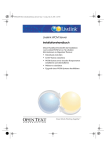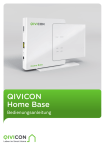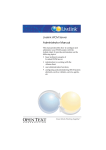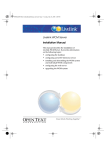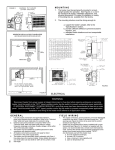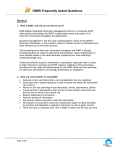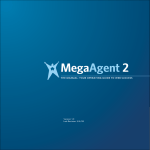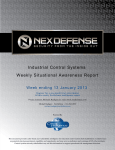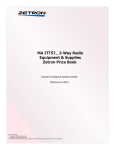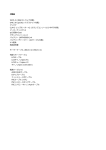Download Livelink WCM Server 9.7
Transcript
Livelink WCM Server 9.7.1 Release Notes Release Notes – Livelink WCM Server Copyright Information Open Text Corporation 275 Frank Tompa Drive, Waterloo, Ontario, Canada, N2L 0A1 Tel: +1-519-888-7111 Toll Free Canada/USA: 1-800-499-6544 International: +800-4996-5440 Fax: +1-519-888-0677 E-mail: [email protected] FTP: ftp://ftp.opentext.com For more information, visit http://www.opentext.com Copyright 2008 by Open Text Corporation. Open Text Corporation is the owner of the trademarks Open Text, The Content Experts, Great Minds Working Together, Livelink, Livelink ECM, Livelink ECMeDOCS, Livelink MeetingZone, MeetingZone, B2BScene, B2BScene.com, Client/Surfer, Collaboration, Creative Desktop, Further Faster, Hyperinnovation, Internet Anywhere ,Livelink IRIMS, IRIMS, IXOS, Livelink OnTime, OnTime, Livelink Remote Cache, Microstar, MyLivelink, O & Design, Odesta, Odesta Helix, Odesta Livelinke, Open Text Intranet, Open Text Web Index, Personality +, Putting Knowledge To Work, Techlib, The Hyperlinked Organization, The Source For Business Knowledge, Worksmart, and World Of E among others. This list is not exhaustive. ACKNOWLEDGEMENTS SAP®, R/3® and SAP ArchiveLink® are registered trademarks of SAP AG. Adobe® is a trademark of Adobe Systems Incorporated. Lotus® and Lotus Notes® are registered trademarks of Lotus Development Corporation. Domino is a trademark of Lotus Development Corporation. Microsoft® and Microsoft SQL® are either registered trademarks or trademarks of Microsoft Corporation in the United States and/or other countries. Oracle® is a registered trademark of Oracle Corporation. Netscape and the Netscape N and Ship's Wheel logos are registered trademarks of Netscape Communications Corporation in the U.S. and other countries. Firefox® is a registered trademark of the Mozilla Foundation. Sentry Spelling-Checker Engine Copyright © 2000 Wintertree Software Inc. WordNet 2.0 Copyright © 2003 by Princeton University. All rights reserved. Outside In® Viewing Technology © 1992-2002 Stellent Chicago, Inc. All rights reserved. Outside In® HTML Export © 2002 Stellent Chicago, Inc. All rights reserved. Portions of eDOCS DM are copyrighted by DataDirect Technologies, 1991-2002. All other products or company names are used for identification purposes only, and are trademarks of their respective owners. All rights reserved. Page 2 Release Notes – Livelink WCM Server Copyright © 2008 Gauss Interprise AG Hamburg, Gauss Interprise, Inc. Irvine, California. All rights reserved worldwide. This document and the related software are property of Gauss Interprise AG or its suppliers and protected by copyright and other laws. They are distributed under licenses restricting their use, copying, distribution, and decompilation. Neither receipt nor possession of this document confers or transfers any right to reproduce or disclose any part of the contents hereof. No part of this document may be reproduced in any form by any means without prior written authorization of Gauss Interprise AG or Gauss Interprise, Inc. Moreover, the regulations of the software license agreement apply to this documentation. All brand names and trademarks mentioned are the property of their respective owners. http://www.opentext.com/bridging/gauss.html Unless stated differently the term Open Text will be used in place of “Open Text Corporation”, “IXOS Software AG”, “Gauss Interprise AG”, and “Gauss Interprise, Inc.” or any combinations of them. Thursday, August 06, 2009 Page 3 Release Notes – Livelink WCM Server Table of Contents Introduction ....................................................................................... 5 Supplementary Documentation....................................................................................5 General Notes..................................................................................... 6 Release Notes ........................................................................................................6 Delivery and Service ................................................................................................6 Scope of Supply ......................................................................................................6 Software........................................................................................................................ 6 Demo Software ................................................................................................................ 6 Licenses ........................................................................................................................ 7 External Libraries ............................................................................................................. 7 Documentation.......................................................................................................8 General ...............................................................................................................8 Technical Notes .................................................................................. 9 Hardware Requirements............................................................................................9 Software Requirements........................................................................................... 11 Operating System ............................................................................................................ 12 HTTP Server................................................................................................................... 13 Browsers for Content Client and InSite Editing .......................................................................... 14 Relational Database.......................................................................................................... 16 LDAP Directory Services ..................................................................................................... 17 Livelink Enterprise Server................................................................................................... 18 JSP Engine/Application Server ............................................................................................. 19 Administration Client ........................................................................................................ 21 Secure Access................................................................................................................. 22 Search Server Connector .................................................................................................... 24 WebDAV ....................................................................................................................... 25 Content Miner (optional) .................................................................................................... 26 Livelink WCM Server Installation ................................................................................ 27 Known Restrictions .............................................................................28 Appendix A: Livelink WCM Server Name Mapping ........................................37 Page 4 Release Notes – Livelink WCM Server Introduction These Release Notes describe the system requirements for installation and use of Livelink WCM Server. This document is intended for administrators. An administrator requires the following: • Familiarity with the use of a universal client (web browser) such as Mozilla Firefox or Microsoft Internet Explorer. • Knowledge of the installation and configuration of an HTTP server (web server) and/or a JSP engine/application server. • Knowledge regarding the respective operating system. • Knowledge of relational databases (RDBMS), such as Oracle. • If the integration with Livelink ECM – Enterprise Server is used, Livelink ECM – Enterprise Server knowledge is required If you have previously used the VIP CM Suite by Gauss, you will find that familiar components have new names. A mapping of new names to the previous names is included in “Appendix A: Livelink WCM Server Name Mapping”. Supplementary Documentation This document is not to be regarded as a replacement for the product documentation of the standard products in use or the documentation of Livelink WCM Server. The reader should be familiar with the documents listed below if applicable. They are not supplied with Livelink WCM Server. • Documentation of the web browsers used • Documentation of the HTTP server used • Documentation of the JSP engine/application server used • Documentation of the database software used • Documentation of LDAP Server used • Livelink ECM – Enterprise Server documentation Page 5 Release Notes – Livelink WCM Server General Notes Release Notes Together with this document, Livelink WCM Server is released. Currently, Livelink WCM Server comprises the following products: • WCM Server • Content Client • InSite Editing • Administration Server • Administration Client The use and maintenance of these products is asserted in accordance with the currently released version of the General Terms of Software Use and Maintenance for the Livelink WCM Server products subject to the restrictions listed in this document. Delivery and Service For information on contact persons and other support matters, please refer to the supplied Support Guideline and your Individual Support Information. Scope of Supply Software Livelink WCM Server is supplied in the Open Text Knowledge Center. Demo Software Any demo software and documentation that is made available as part of this product is the copyrighted work of Open Text and is for demonstration purposes only. It may not be resold or used for any commercial purposes. THE DEMO SOFTWARE IS PROVIDED "AS IS" AND WITHOUT WARRANTIES AS TO PERFORMANCE OR MERCHANTABILITY. THE SOFTWARE IS PROVIDED WITHOUT ANY EXPRESS OR IMPLIED WARRANTIES WHATSOEVER. NO WARRANTIES OF MERCHANTABILITY OF FITNESS FOR A PARTICULAR PURPOSE ARE OFFERED. IN NO EVENT SHALL OPEN TEXT BE LIABLE FOR ANY SPECIAL, INDIRECT OR CONSEQUENTIAL DAMAGES OR ANY DAMAGES WHATSOEVER RESULTING FROM LOSS OF USE, DATA OR PROFIT ARISING OUT OF OR IN CONNECTION WITH THE USE OR PERFORMANCE OF THE SOFTWARE. Page 6 Release Notes – Livelink WCM Server The documents and related graphics published could include technical inaccuracies or typographical errors. Changes are periodically added to the information herein. Open Text may make improvements and/or changes in the products and/or the programs described herein at any time. Open Text is not obliged to remedy any errors contained therein in future versions or in the form of a Service Pack. Licenses After the customer has notified Open Text of the IP addresses that are to be used for the installation, license keys without time restriction will be supplied to the customer by Open Text. Each customer receives individual license keys. If necessary, for example if there is a change in the license agreement or the IP addresses used, the customer can have the license modified or a new license key created by the order department at Open Text. Normally, new license keys are then sent to the customer by e-mail. Notes For the use of the Content Client, InSite Editing, and the Content Client (Classic), the integrated WYSIWYG HTML editor EditLive! from the company Ephox is available. An unlimited enterprise license of the Ephox EditLive! product is part of the license for Livelink WCM Server. External Libraries Livelink WCM Server uses various third-party class libraries. For an overview of the class libraries used and their license conditions, refer to the file externalLibs.html on the product CD. Page 7 Release Notes – Livelink WCM Server Documentation The following table gives an overview of the available documentation: Available documentation English German Content Client User Manual x x Content Miner Manual x x Livelink Integration Manual x Administrator Manual x Installation Manual x Lucene Search Server Connector Manual x x Portal Manager API Programmer’s Manual x x WCM WebServices Programmer’s Manual x x WCM Java API Programmer’s Manual x WCM Lightweight API Programmer’s Manual x Manuals Online Help Content Client Online Help x Admin Client Online Help x x General • Up-to-date information on Livelink WCM Server and new functionalities is available in the Knowledge Center (https://knowledge.opentext.com/wcm). • Please make sure to always use the most current Service Pack available for Livelink WCM Server. Service Packs are available in the Knowledge Center (https://knowledge.opentext.com/wcm). • You can find the most current version of the documentation in the Knowledge Center (https://knowledge.opentext.com/wcm). Page 8 Release Notes – Livelink WCM Server Technical Notes Hardware Requirements This section describes the minimum hardware requirements for operation of Livelink WCM Server. The respective values can be found in the table at the end of this section. The essential active software components of Livelink WCM Server are located on a third-party hardware server system. As a result, the main load (for maintenance of the intranet or Internet websites) is carried by this server. Please note that the system requirements stated in the following merely represent the minimum requirements for the server. If complex and extensive websites are to be managed, the performance of the hardware used may have to be modified accordingly by the customer. For the basic installation of the Livelink WCM Server components, disk space should be available on the relevant server system as indicated in table “Hardware requirements”. The value indicated does not include the necessary disk space for installation and operation of the HTTP server used, the database system, and the JSP engine/application server (if applicable). In addition, disk space is required for the digital content you create and maintain with Livelink WCM Server. No default value can be given for this disk space requirement, since it depends primarily on the type, number, and size of the content to be managed. Accordingly, generous disk space should be provided for these components when planning the system architecture. For the clients, a distinction must be made between the requirements for users working as authors on the one hand, and for end-user workstations on the other hand. End users are intranet or Internet users. The hardware requirements for “author” systems are higher than for “end-user” systems. All values given here are to be understood as minimum values based on the use of Livelink WCM Server in combination with a web browser. Requirements for any other programs in use must be added to these values. Page 9 Release Notes – Livelink WCM Server The following table gives an overview of the hardware requirements. Hardware requirements System Hardware component Server Computer Intel Pentium III Sun with Sparc processor Memory 1 GB Disk space for specific program files 500 MB Free disk space for the content to be 4 GB managed Client Computer Intel Pentium III Memory 256 MB Free disk space 1 GB Here, no general specification can be made about the network load caused by operating Livelink WCM Server. In the case of very large installations with numerous users, it may be advisable to set up distributed proxy servers in order to reduce the load on the master server and the network architecture. Proxy servers can cache frequently requested information (either static or dynamic information) and thereby carry part of the network load. For productive operation of Livelink WCM Server, an adequate network architecture in a failure-free operation is required. This includes both bandwidths provided in accordance with the requirements and correctly operating network components (TCP/IP stack, network adapters, lines, routers, switches, firewalls, etc.). The availability of a suitable network environment should be provided by the operator of Livelink WCM Server already in the planning phase and is neither included in the scope of supply nor is it subject to the responsibility of Open Text. This also applies to the access of the clients for editing objects to Livelink WCM Server. Page 10 Release Notes – Livelink WCM Server Software Requirements The following standard products are required for operating Livelink WCM Server: • Operating system • HTTP server • Web browser (universal client) • Relational database • Java Virtual Machine • JSP engine/application server • Livelink ECM – Enterprise Server (if Enterprise Server integration is used) We recommend that you install the latest service pack for the standard products. The following sections offer a detailed overview of the released platforms and the recommended products. There is no obligation of Open Text to provide a backward fix of the original problems if vendors of third-party products decide to stop their support of the respective versions. Customers who run into these problems have the option to upgrade to a newer Livelink WCM Server version. With every new version of Livelink WCM Server, Open Text is keen to support the latest versions of the involved third-party products in order to provide a smooth upgrade path for its customers. This holds true for all third-party products, e.g. Java Virtual Machines, application servers, browsers, operating systems, and databases. Page 11 Release Notes – Livelink WCM Server Operating System The computer used for the operation of the WCM servers must be running on one of the following operating systems: Released operating systems Operating system Microsoft Windows 2000 Server Microsoft Windows Server 2003 Microsoft Windows Server 2003 64 Bit Sun Solaris 9 (Sparc) Sun Solaris 10 (Sparc) Red Hat Enterprise Linux ES 3 (x86) Red Hat Enterprise Linux ES 3 64 Bit SuSE Linux ES 10 (x86) SuSE Linux ES 10 64 Bit AIX 5L 5.3 (PowerPC)1 Notes • Livelink WCM Server requires the Sun JVM 1.5.0 or higher. Installation of the J2SE SDK may require the installation of current operating system patches. • If a WCM server runs in a JSP engine or as a web application in an application server, the JVMs listed in section “JSP Engine/Application Server” apply. General Note Open Text cannot assume any liability for the correct functionality of the JVM and the operating system. For an overview of known problems in the JVM (e.g. Garbage Collection), refer to: http://bugs.sun.com/bugdatabase/index.jsp. 1 Java™ 2 Runtime Environment, Standard Edition (build 1.5.0) Page 12 Release Notes – Livelink WCM Server HTTP Server Livelink WCM Server has been tested with the Microsoft Internet Information Server 5.0 and 6.0, and the Apache HTTP Server 2. Open Text will support Livelink WCM Server running with any HTTP Server but is not responsible for the installation, configuration, or support of the HTTP Server. Open Text has no responsibility to address any incompatibilities found with the HTTP server. General Note Open Text cannot assume liability for security problems caused by the HTTP server. Page 13 Release Notes – Livelink WCM Server Browsers for Content Client and InSite Editing Content Client, Content Client (Classic), and InSite Editing can be used to edit and manage website objects. At present, only the browsers listed in the following table are supported. Released browsers Browser MS MS MS Mozilla Mozilla Internet Internet Internet Firefox Firefox Explorer 6 Explorer 7 Explorer 8 3.0 3.5 SP1 Operating system Microsoft Windows 2000 x Microsoft Windows 2003 x x x x x Microsoft Windows XP x x x x x x x x x Microsoft Vista Notes • For Microsoft Internet Explorer and Mozilla Firefox, the Java plug-in 1.5 or 1.6 by Sun Microsystems is supported. • For Mozilla Firefox: Problems with the graphical user interface may occur. However, these problems do not affect the functionality of the Content Client. • The browser must allow additional browser windows to open. Make sure that the “Popup blocker” feature is disabled. • For Internet Explorer 8 be sure to enable the following setting to avoid that the browser opens always new windows. ‘Tools -> Internet Options -> Security -> Custom Level -> Miscellaneous -> Navigate windows and frames across different domains’. It is also possible to add the domain to the Local Sites. The above setting is enabled in this zone. • For the Content Workflow Modeler, Java Web Start 1.5 or 1.6 must be used. It is supplied with the J2SE SDK/JRE 1.5 or 1.6 and is also available separately (http://java.sun.com/products/javawebstart/). The Content Workflow Modeler can be executed as a separate application. For this purpose, the J2SE SDK/JRE 1.5 or 1.6 is required which can be downloaded at http://java.sun.com/javase/downloads/index.html. • The Java plug-in 1.5 or 1.6 must be used for the integrated HTML editor of the Content Client and of InSite Editing. • The Content Client (Classic) only supports UTF-8 encoding if all components used (database, HTTP server, JSP engine, and browser) are configured accordingly. Page 14 Release Notes – Livelink WCM Server General Note Open Text cannot assume any liability for the correct functionality of the browsers. Page 15 Release Notes – Livelink WCM Server Relational Database The website objects are stored in a relational database. For this purpose, only the database systems listed in the following table in the version indicated are supported: Supported database systems Database system Oracle 9.i Standard Edition Release 2 (9.2.0) Oracle Database 10g Release 1 (10.1.0.2) Oracle Database 10g Release 2 (10.2) Microsoft SQL Server 2000 Microsoft SQL Server 2005 Notes • The performance of Livelink WCM Server strongly depends on the speed of the JDBC driver used. Please also note the restrictions of the respective manufacturer (supported platforms, etc.). • The JDBC driver for Oracle and Microsoft SQL Server 2005 may have to be replaced by a current JDBC driver of the database installation. • The JDBC driver used for Microsoft SQL Server must be compatible to the Microsoft SQL JDBC driver. A driver for Microsoft SQL Server 2000 is not supplied with the product CD. • The SQL database should use a case-sensitive encoding (Collation name parameter), if possible “SQL_Latin1_General_CP1_CS_AS”. • In case of Livelink WCM Server websites with a large number of objects, it was observed that the response time behavior of Oracle was significantly better than that of Microsoft SQL Server 2000. This behavior was also observed when many objects were assigned a template. Also, we recommend the use of distributed data storage when using Microsoft SQL Server 2000. • For high traffic websites, Open Text encourages to enable the new snapshot isolation level of Microsoft SQL Server 2005. This level avoids reader-writer blocking scenarios. See http://msdn2.microsoft.com/enus/library/tcbchxcb.aspx for details. General Note Open Text cannot assume any liability for the correct functionality of the JDBC drivers. Page 16 Release Notes – Livelink WCM Server LDAP Directory Services As an alternative to the relational database, an LDAP directory service can be used for storing user data, provided that this service works according to the LDAP standard LDAPv3 (LDAP = Lightweight Directory Access Protocol). At present, only the LDAP servers listed in the table are supported for the user administration of Livelink WCM Server. Released LDAP servers LDAP server Sun Java System Directory Server 5.2 Novell NDS eDirectory 8.7 Microsoft Active Directory under Windows 2000 Microsoft Active Directory under Windows 2003 Open LDAP 2.4.10 Notes • Livelink WCM Server supports communication by means of LDAP. However, Livelink WCM Server does not necessarily support each function of the respective LDAP server. • When using Microsoft Active Directory under Windows 2000, the operating system service pack 4 or higher must be installed on the computer hosting the Active Directory. General Note Open Text cannot assume any liability for the correct functionality of the LDAP servers. Page 17 Release Notes – Livelink WCM Server Livelink Enterprise Server Livelink WCM Server allows you to access data from a Livelink ECM – Enterprise Server. At present, only the Livelink ECM – Enterprise Server versions listed in the following table are supported. Released Livelink Enterprise Server versions Livelink ECM – Enterprise Server Livelink ECM – Enterprise Server version 9.2.0 and 9.2.0 SP1 Livelink ECM – Enterprise Server version 9.5.0 and 9.5.0 SP1 Livelink ECM – Enterprise Server version 9.6 Livelink ECM – Enterprise Server version 9.7 Notes • Livelink ECM – Enterprise Server integration is only supported when the Enterprise Server is using Oracle or MS SQL Server databases. Sybase is not supported. • Refer to the Knowledge Center to get an overview about the supported environments of Livelink ECM – Enterprise Server. (https://knowledge.opentext.com/knowledge/llisapi.dll?func=ll&objId=751264) Page 18 Release Notes – Livelink WCM Server JSP Engine/Application Server Using Livelink WCM Server requires a JSP engine/application server. At present, only the software listed in the following table and marked with an “x” is supported. x x x IBM JVM 1.5.01 x Bea JVM 1.5.01 Sun J2SE 6 Java Virtual Machine JVM of the operating system Released JSP engines/application servers and JVM JSP engine/application server Resin 3.0.23 4 Resin 3.1.7 BEA WebLogic 9.1 x Tomcat 5.0.28 2 x Tomcat 5.5.26 x x Tomcat 6.0.18 x x IBM WebSphere Application Server 6.1 x Sun Java System Application Server 8 x Oracle Application Server 10g (9.0.4) x SAP J2EE Engine 6.30 SP 3 3 x 1 JVM contained in the application server 2 When operating Tomcat in connection with Microsoft Internet Information Server 5.0, the connector module JK 1.2.10 must be used (http://jakarta.apache.org/tomcat/connectors-doc/). The combination with Microsoft Internet Information Server 6.0 is not supported. 3 Support for the SAP J2EE Engine requires Special Release Notes for the specific customer. 4 The startup time of Resin 3.0.23 is very slow because of the JAR verifier used by this Resin version. Please contact Customer Support if you want to decrease startup time. Page 19 Release Notes – Livelink WCM Server Note If the JSP engine used exclusively supports the Servlet API 2.2, the Content Client can only manage characters from the Latin-1 character set (ISO-8859-1 encoding). Special characters from the Unicode character set (UTF-8 encoding) cannot be managed. In this case, ISO-8859-1 encoding should be selected during the installation. The created websites should also use ISO-8859-1 encoding and not UTF-8 encoding. Open Text will support Livelink WCM Server running with any of the above mentioned JSP engines/application servers, but is not responsible for the installation, configuration, or support of the JSP engine/application server. Open Text has no responsibility to address any incompatibilities found with the JSP engine/application server. General Note Open Text cannot assume any liability for the correct functionality of the JSP engines/application servers. Page 20 Release Notes – Livelink WCM Server Administration Client For the central administration of Livelink WCM Server, the Administration Client is provided. At present, the Administration Client is only supported on the operating systems listed in the following table. Released operating systems for the Admin Client Operating system Sun JVM 1.5.0 Sun JVM 1.6.0 Microsoft Windows 2000 X Microsoft Windows 2003 X x Microsoft Windows XP X x Note For the distributed Admin Client, Java Web Start 1.5 or 1.6 must be used. It is supplied with the J2SE SDK/JRE 1.5 or 1.6 and is also available separately (http://java.sun.com/products/javawebstart/). General Note Open Text cannot assume any liability for the correct functionality of the JVM and operating systems. Page 21 Release Notes – Livelink WCM Server Secure Access Secure Access is the access control component of Livelink WCM Server. It offers the possibility to extend the access control functionality – which is automatically part of the Edit and QA views – to the Production view. This makes it possible to control access to all objects in a website on an object-specific basis in productive operation (i.e. also on the intranet or Internet). Please note that only static content that is accessed via HTTP can be protected with Secure Access. Active content accessing other objects, such as Content Assembly objects, may circumvent Secure Access. At present, Secure Access is only supported for the combinations of server operating system, HTTP server, and JSP engine/application server listed in the table and marked with an “x”. If the JSP engine supports the servlet API 2.3, the use of Secure Access as a filter is mandatory. BEA WebLogic 9.1 x Resin 3.0.23 Resin 3.1.7 x Tomcat 5.0.28 x Tomcat 5.5.26 x Tomcat 6.0.18 x IBM WebSphere Application Server 6.1 Sun Java System Application Server 8 x SuSE SLES 9 or 10 AIX 5L 5.3 Solaris 10 Solaris 9 Win 2003 Server Win 2000 Server Win 2003 Server MS MS Use of the respective JSP IIS IIS engine as HTTP server 5.0 6.0 Win 2000 Server Win 2003 Server Apache 2 RedHat ELES 3 JSP Engine Operating system HTTP server Released configuration options for Secure Access x x x x x x x x X x X x x x x x x x x x x x Page 22 Release Notes – Livelink WCM Server Note In the current version of Livelink WCM Server, Secure Access is only released for operation together with Content Miner, if file indexing is performed on the basis of a deployment system that is not protected by Secure Access. Page 23 Release Notes – Livelink WCM Server Search Server Connector The Search Server Connector is used to integrate the full-text search engine Jakarta Lucene and the Livelink Enterprise Search. The Jakarta Lucene version provided with Livelink WCM Server is supported. Released Livelink ECM – Enterprise Server versions for Search Server Connector Livelink ECM – Enterprise Server Livelink ECM – Enterprise Server version 9.2.0 and 9.2.0 SP1 Livelink ECM – Enterprise Server version 9.5.0 and 9.5.0 SP1 Livelink ECM – Enterprise Server version 9.6 Livelink ECM – Enterprise Server version 9.7 Note For systems using the integration with Livelink Enterprise Search: the Search Server Connector supports Livelink ECM – Enterprise Server on Windows and Solaris systems. General Note Open Text cannot assume any liability for the correct functionality of Lucene. Page 24 Release Notes – Livelink WCM Server WebDAV Livelink WCM Server allows you to use WebDAV clients. At present, only the WebDAV clients listed in the following table are supported. Released WebDAV clients WebDAV client Microsoft Web Folder Version 10 & 11 Microsoft Office 2003 For using WebDAV, WebDAV-capable web servers are required. At present, only the servers listed in the following table can be used for Livelink WCM Server. BEA WebLogic 9.1 x SuSE SLES 9 or 10 HP-UX 11.11 AIX 5L 5.3 Solaris 9 Win 2003 Server Win 2000 Server Win 2000 Server Win 2003 Server Apache MS Use of the respective JSP 2 IIS engine as HTTP server 5.0 RedHat ELES 3 JSP Engine Operating system HTTP server Released combinations for WebDAV with Livelink WCM Server x Resin 3.0.23 x x Resin 3.1.8 x x Tomcat 5.0.28 x Tomcat 5.5.26 x x x Tomcat 6.0.18 x x x IBM WebSphere App. Server 6.1 x x x x General Note Open Text cannot assume any liability for the correct functionality of the JSP engines, web servers, and WebDAV clients. Page 25 Release Notes – Livelink WCM Server Content Miner (optional) By means of the intelligent semantic search functions of Content Miner (Readware 4.2), not only keywords, but also synonyms and related terms can be found. At present, Content Miner is only supported for the server operating systems listed in the following table. Released server operating systems for Content Miner Server operating system Microsoft Windows 2000 Server Microsoft Windows Server 2003 Sun Solaris 9 (Sparc) Page 26 Release Notes – Livelink WCM Server Livelink WCM Server Installation We recommend that you carry out the concept planning process and installation of Livelink WCM Server together with Open Text. For the installation of third-party products such as RDBMS and LDAP directory service, only those installation and configuration aspects are described in the Livelink WCM Server documentation that are relevant to the integration of these products with Livelink WCM Server. The Livelink WCM Server documentation does not contain a complete description of the installation of the supported third-party products. For this purpose, please refer to the documentation of the manufacturer. Page 27 Release Notes – Livelink WCM Server Known Restrictions Livelink WCM Server offers all the functions described in the documentation relevant for this software version, subject to the restrictions described in this chapter. 1. If no graphical user interface can be used, you must execute the installation as a console installation. 2. JSP engine If multiple websites are deployed with server-relative deployment systems and if the associated objects belong to a web application running in a JSP engine, the file system paths must be unique. When communicating in servlet mode and via HTTP, the WCM server is unable to check whether the JSP engine is configured correctly and is running. In case of misconfiguration and malfunction of the JSP engine, the WCM server is not accessible. When Resin or Tomcat is to be used as JSP engine in connection with WebServices, the configuration of the JSP engine must be modified. For information on the configuration, contact Technical Support. When Tomcat is used as JSP engine, the attribute reloadable= "true" cannot be used. Otherwise, the WCM server running in the JSP engine is restarted each time changed classes are reloaded. It was observed that the WebSphere Application Server changed the manifest file of the Java archives in some cases. After this, the Download applet of the Content Client could no longer be used. (java.lang.SecurityException: invalid SHA1 signature file digest for ...) To avoid this problem, exchange the Java archives after deployment of the web application. For some JSP engines, such as Tomcat, the check box Reuse temporary files in the deployment system configuration (statification) must not be selected. Otherwise, the files will not be generated properly. The problem occurs when many objects are statified at the same time. Contents from formerly generated files are sometimes transferred to currently generated files. If Livelink WCM Server is used together with the Sun Java System Application Server, the WCM classes must be activated in the Java Policies. For further information, refer to the Knowledge Center (https://knowledge.opentext.com/knowledge/llisapi.dll?func=ll&objID=345 5579&objAction=view&type=0&Period=31&view=&Show=0). The JARs contained in the latestpatch directory will be automatically copied into the WEB-INF/lib directory of the web application and the lib directory of the WCM server. Be sure to remove the JAR files from the latestpatch directory after installing a service pack. Page 28 Release Notes – Livelink WCM Server 3. In a distributed WCM system, you have to ensure that the system time is identical on all hardware servers used. 4. When installing Livelink WCM Server, note that you cannot always work on mounted directories. Directories that the WCM system potentially moves and/or renames or deletes must never be mounted nor contain mounting points. The reason for this is that Java is not capable of renaming or deleting mounted directories. Symbolic links cannot be used in connection with the WCM products. 5. 6. Deployment system The name of the deployment base directory must not contain any space characters. The reason for this is that some HTTP servers (e.g. Apache HTTP server) do not permit alias names containing space characters. Only characters which can be represented by the file system should be used in file names. This applies in particular when a static deployment system is used. Under Unix, workflow images can only be generated if the X server is running and the JVM 1.5 or higher can reach the X server for rendering the images and fonts. Under UNIX, thumbnails can only be generated if the X server is running and the JVM 1.5 or higher is able to access the X server for rendering the images and fonts or if the JVM is running in headless mode. The configuration of a deployment system can only be changed when the corresponding WCM server is running. If no standard deployment system is set up for the Edit view of the website, the following restrictions apply: Images inserted in the integrated HTML editor via “Insert > Insert Image > Local Image”, are not imported into the WCM system. Existing objects are not recognized when an object containing embedded objects is added, replaced, or checked in. The references to embedded objects are not recognized correctly, when a topic is selected for the embedded objects. The <@ include> directive does not work with dynamic deployment systems as it can only handle HTML code. Oracle database Page 29 Release Notes – Livelink WCM Server 7. The Oracle database interprets the lengths restrictions of the VARCHAR2 fields as the maximum number of bytes to be stored. In the case of ISO8859-1 encoding, this corresponds to one character each. If the Oracle database is set to UTF-8 during installation, special characters are represented by several bytes in some cases. This may have the following effect: some texts which would fit into the database field concerning the character length do not fit due to the byte length. This error is not remedied by the client implementation. The database will generate and output an according error message. In the case of the Oracle database, the user ID entered for a JDBC pool for accessing the RDBMS must not contain hyphens or other special characters. All WCM servers in the WCM system must use the same database driver. In connection with Bea WebLogic 8.1, it was observed that this software did not use the database driver from the web application. The PoolManager report in the Admin client contains information on the database driver used. If you use an Oracle Real Application Cluster, ask your Oracle administrator if the initialization parameter MAX_COMMIT_PROPAGATION_DELAY can be set to 0 or to using only one cluster node. (For this purpose, the JDBC URL must be adapted. Oracle load balancing should not be performed; the second node is only used as a fallback.) For information on the MAX_COMMIT_PROPAGATION_DELAY parameter, refer to the Oracle documentation. LDAP When using Microsoft Active Directory for user administration, user passwords can only be changed if there is a secure connection (SSL) to the LDAP server. Also, passwords may not contain certain special characters such as the Euro symbol. When using Microsoft Active Directory on Windows 2003 and creating new users with the Admin client, the user is not active in the Active Directory, because the attribute userAccountControl cannot be set. The WCM Java API and the Portal Manager API contain methods that internally cause LDAP requests in the context of user administration (login, loading users, functional areas, or websites). The number of elements returned in the response can be configured in the Admin client. It may, however, not exceed the limit set in the LDAP server. To speed up the display of principals when using the collective groups/roles function and the Novell eDirectory, the following search must be optimized in the LDAP server: (|(objectclass=vipUser)(objectclass=vipGroup)(objectclass=vipRole)) 8. If you use Livelink ECM – Enterprise Server for the user administration, we recommend that you edit the user names in Livelink ECM – Enterprise Server. Page 30 Release Notes – Livelink WCM Server 9. In order to use secure connections (SSL) for the communication between the WCM servers, all WCM servers must use the same version of the Java Virtual Machine. 10. Livelink WCM Server supports a ReceiveBufferSize of max. 64 KB. 11. Remote API of Livelink WCM Server In addition to the specified port, additional ports will be opened when the Remote API is used. It was observed that the processes of the WCM server for which the remote API is enabled could not be stopped. The installation path of the WCM server or the web application may not contain any spaces if RMI is used (e.g. using the Remote API or WCM API). This is a known bug within the JDK. See http://bugs.sun.com/bugdatabase/view_bug.do?bug_id=4496398 for details. 12. Content Client, InSite Editing, and Content Client (Classic) The default text size (medium) should be used in the browser and in the settings of the operating system. The clients must not be protected by Secure Access. Also, problems may occur in active clients if the website is restarted. In Mozilla Firefox, cookie handling must be set to the option “Enable cookies for the originating web site only”. Adapt the security settings of your browser in such a way that all contents can be accessed. In order to display the graphical user interfaces, JavaScript and CSS files must be accessed. 13. Content Client If a large number of objects is to be displayed below a topic, problems may occur when using the topic navigation. The same problem exists if the template view is used and a single template has a large number of objects assigned. When using Japanese character sets, it might not be possible to use the keyboard shortcuts. In this case, the respective functions and objects must be selected with the mouse. In connection with Mozilla Firefox, clicking the plus sign of a topic just created in the Content Client caused Mozilla Firefox to quit in some cases. To avoid this problem, update the view after creating a topic. The same problem has been discovered after starting asynchronous actions like importing objects from a ZIP file and executing other actions in parallel. To avoid this, no actions should be started when the asynchronous action is still running. In some cases, it was observed that Mozilla Firefox froze for a certain time. It was required to restart Mozilla Firefox in some of these cases. Also, it was observed in some cases that the users were unable to close the window and that the toolbar was not displayed correctly if the icons contained text. Page 31 Release Notes – Livelink WCM Server Objects already existing in the WCM system are not recognized, when topics are selected for importing embedded objects. The "Dependent objects" dialog might not appear in the "Object list" view if multiple objects are selected. A metadata change of a selection of objects in the "Object list" view works only if the change is allowed for each selected object. The reference warning dialog is not correctly displayed if a workflow is used to forward objects with references. The topic names after a multi-import may not be as expected if directories with empty spaces are used within the ZIP file. Changes to metadata of formatted text attributes using the integrated editor are only applied after the "Save" button is clicked. It is not possible to correct these attributes multiple times without saving them. In a few dialogs, the help topic is missing (e.g. in the "Browse template" dialog). If a topic with many subordinate objects is deleted it may take a while until the confirmation dialog is displayed. In Internet Explorer on Windows Vista, you have to add the URL of the Content Client to the Trusted Sites section, otherwise the Download Applet will not work correctly. If you use Tomcat and want to use file names with special characters, you must add the following parameter to the Connector element in the server.xml configuration file, which is located in the Tomcat config directory: <Connector ... useBodyEncodingForURI="false" URIEncoding="UTF8" /> If this parameter is not set, you will not be able to upload files containing special characters in their file names with the Download Applet. 14. Content Client (Classic) If a large number of objects is to be displayed below a topic, problems may occur when using the topic navigation. The same problem exists if the template view is used and a single template has a large number of objects assigned. If the Content Client (Classic) runs in a navigator tab window (Mozilla Firefox) and the user changes to another navigator tab, a new Content Client (Classic) window will open after a certain period of time. If you use the Content Client (Classic) with IIS and Resin or Tomcat, the navigation tree will sometimes not be displayed in the left frame. In this case, do the following: 1. Open the file: <web-app>/htmlclient/hcl/LoginUtils/login.jsp. 2. Search for the line de.gauss.vip.htmlclient.Configuration.ALLOW_INTERMEDIATE Page 32 Release Notes – Livelink WCM Server _FLUSH = true (approx. line # 176) 3. Change the value from true to false. 15. InSite Editing When using implicit styles in HTML code, layout problems may occur in InSite Editing. Also, the HTML code of the page must be valid. The browser window must be closed after logging out to remove temporary login information. Java Server Pages containing compile errors cannot be maintained with InSite Editing. They must be maintained with the Content Client. The Refresh/F5 function of the browser must not be used. Frame objects cannot be edited with InSite Editing. The InSite Editing toolbar is displayed on pages which are included via JSP includes expressions. Using the menu button to create new objects may fail because the list of categories is empty. Use the context menu instead. 16. Integrated HTML editor For information on the requirements for editing UTF-8 encoded content with the integrated HTML editor, refer to the manufacturer’s website (http://www.ephox.com). Do not close the integrated HTML editor while working in the Code view. The integrated HTML editor caches images during the complete lifetime of the JVM. For this reason, the editor still displays the "old" image after an image has been changed. Restart the browser to display the new image. The integrated HTML editor does not support all HTML table features. 17. Content Miner Under UNIX, the Readware servers cannot be stopped using the keyboard shortcut “Ctrl-C” although this possibility is indicated when starting the processes. In this case, please use the system-specific kill command instead. Content Miner cannot access files protected by Secure Access. Add a deployment system using the base URL “http://127.0.0.1” that is not protected by Secure Access. The documents of this deployment system can then be indexed by Content Miner. Through the usage of a local deployment system, no security loopholes arise. Please note that the HTTP server must be configured accordingly. Secure connection (SSL): The Content Miner batch tools do not work with a WCM server using SSL connections. Please use the functions of the Admin client instead. Under Linux, the signature database of the Readware server cannot exceed 2 GB. The number of the indexed documents that can be stored in the 2 GB range cannot be determined. Page 33 Release Notes – Livelink WCM Server In order to use Readware with Solaris or Linux, OpenSSL must be installed (libssl.so.0.9.6). For operation under Linux, the libraries libstdc++.so.5 and libgcc_s.so.1 must be accessible. Readware is unable to index UTF-8 encoded contents. If a collection is configured with a root topic, and an object is moved out of the indexed sub tree, the object is not removed from the index. 18. Livelink Enterprise Search servers If Livelink ECM – Enterprise Server is used as the Search server, only the Livelink Search API search can be used for internal collections. A Livelink Enterprise Search server can manage several collections that share a slice. Several Search servers or WCM systems must, however, not share a slice. 19. When accessing Enterprise Server objects that have categories assigned via the WCM system, performance or memory issues may arise if: - the Enterprise Server objects are assigned many categories, - the categories contain many attributes, or - the attributes contain many values. Also, the WCM system does not check the permissions for an Enterprise Server category. A user is able to access an Enterprise Server category via the WCM system even if the user does not have the “See” permission. 20. Modules for integration with Livelink ECM – Enterprise Server: With Livelink ECM – Enterprise Server 9.5, new functions for Enterprise Server modules were introduced. For this reason, upgrading the modules for integration of Livelink WCM Server with Livelink ECM – Enterprise Server (WCM Kernel Integration and WCM User Administration modules) may not work. If you experience problems during the upgrade, deinstall the old modules first, and then install the new ones. 21. Secure Access & InSite Editing If an AVI file protected by Secure Access is opened with the Media Player plug-in, a login is required each time the file is called. 22. Please note that only static content that is accessed via HTTP can be protected with Secure Access. Active content accessing other objects, such as Content Assembly objects, may circumvent Secure Access. 23. When using Java Web Start in connection with the Content Workflow Modeler or the distributed Admin client, the released version of Java Web Start must be installed on the local computer. Also, the print option in the workflow modeler and the Admin client helps cannot be used if they are called via Java Web Start. 24. When using Java Web Start or an Applet in connection with the Content Workflow Modeler or the distributed Admin client, there will be a warning that the certificate has expired. This warning will be displayed because the certificate of the JavaHelp JAR file has timed out. Sun Microsystems does not provide a version with a valid certificate at the moment. Page 34 Release Notes – Livelink WCM Server 25. Export/import If the master Content server is running in a JSP engine (e.g. WebSphere), problems may occur during the export/import and creation of websites. To avoid these problems, start the master Content server directly (not in the JSP engine). When the operation is complete, you can start the master Content server in the JSP engine again. For performing an export/import under Unix/Linux, an X server is required. The subtree export does not export objects with the state "delayed release" even if the objects have already been released. The performance for the ACL help table calculation within a website import or a proxy assignment can be increased now by using a PL/SQL procedure (Oracle databases only). Specify the command line option "-Dexport.useplsql=true" within the start script of the content servers to enable this feature. 26. When importing large ZIP files (> 10 MB), make sure that the client PC has enough memory. Check whether you can use the function “Import linked objects” or a server-side import instead. For information on the server-side import, please contact Technical Support. 27. User IDs In the WCM system, there must not be a user with the user ID "Anonymous". User IDs may only contain the characters described in the online help of the Admin client, even if the LDAP server or Livelink Enterprise server permits other characters in user IDs. 28. When using SSL for a WCM server, the Remote API is also set to SSL 29. Servlet-based deployment system A servlet-based deployment system (option “Use servlet to render JSP templates” in the Admin client) is only released for Resin 3.0.23, Tomcat 5.5.20 and IBM Websphere AS 6.1. A servlet-based deployment system will generate templates also in the Production view, even if the deployment system is configured for statification. Static pages (e.g. HTML pages) that use a JSP template in the template cascade should not contain any dynamic JSP code. Extensive use of Content Assembly features might not work as expected for servlet-based deployment systems. Static pages (e.g. HTML pages) should not contain dynamic content. Content included by an “Object content” attribute, for example, is only allowed in HTML pages if the included WCM object is not based on a JSP template. Page 35 Release Notes – Livelink WCM Server WCM tags used within scriptlet code of a JSP template must use the option source=jsp to be correctly replaced in the generated JSP page. Example: <% String oid = "{VIPOID source=jsp}"; %> 30. WCM Lightweight API The WCM Lightweight API can only be used with Sun J2SE 5 or higher. The WCM Lightweight API is not released for SSL communication. If the configuration of the WCM system is changed, e.g. because a new website is created, it is necessary to restart the server agent of the WCM Lightweight API. Page 36 Release Notes – Livelink WCM Server Appendix A: Livelink WCM Server Name Mapping The table below summarizes the names of the Livelink WCM Server components and maps them to their previous names. Livelink WCM Server Name Previous Name Livelink Web Content Management Server VIP CM Suite Livelink WCM Server VIP CM Suite; VIP WCM server, Content server VIP CM server WCM system VIP CM System Content Manager VIP ContentManager Content Client CMS Client Content Client (Classic) HTML Client InSite Editing VIP InSite Editing Admin client, Administration client VIP Administration tool/program Content Workflow VIP ContentWorkflow Content Workflow Modeler Content Workflow Modeler Secure Access VIP Secure Portal Manager API VIP PortalManager API Search Server Connector Search Server Connector Content Miner VIP ContentMiner Page 37





































